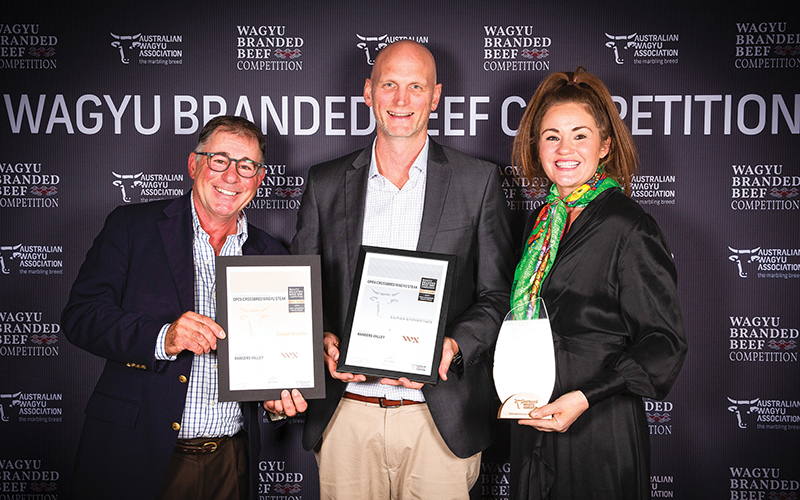One of the world’s most respected premium marbled beef producers, Rangers Valley, specialise in long-fed pure Black Angus, Fullblood Wagyu and Wagyu cross. Their global export programs give consumers quality, tasty, consistently tender, and delicious beef.

Andrew Moore from Rangers Valley (pictured centre) accepts the Wagyu Branded Beef 2022 Class Two Champion Award from Matt and Melissa George from Bovine Dynamics. Matt and Melissa have been generous sponsors of Class Two for many years.
In Australia, Rangers Valley has had great success with its premium Wagyu brands, stamped all through the history books of the Wagyu Branded Beef Competition. But 2022 might have been their most successful year so far – taking out two class champions with entries from their WX brand — almost a clean sweep of all major awards in the competition – a truly remarkable result.
The WX brand produces crossbred Wagyu with the best genetics to create something new and unique for a market looking for something rare and exclusive. In the words of Rangers Valley themselves, “Ours isn’t like other crossbred Wagyu. It stands alone as a product because it’s not just about the Wagyu component – or the marble score. It’s about a newly developed and artfully crafted evolution. This evolution is equally the Wagyu and marble score, plus a deliberate and artful cross breeding – a lineage nexus where one great ancient breed meets another to create a flavour, performance and undeniable quality that’s impossible to define.”
Rangers Valley WX9 2022 class two – crossbred entry achieved a total of 905 points, with a digital marbling of 51% and a digital marbling fineness of 82.2, with a ribeye area of 103cm2. Judges commented on the rich and toasty aroma with creamy and silky fine texture, umami and long-lasting savoury flavours with exquisite succulence and ultimate quality. In the 2022 Commercial MS 5-7 class (class three), they entered a striploin from their WX brand achieving a total of 781 points. The entry recorded a digital marbling of 31% and a digital marbling fineness of 61.2, with a ribeye area of 121cm2. Judges commented that the entry was deliciously caramelised with savoury and sweet notes, silky tenderness, fresh creamy flavour, and lasting juiciness and depth.
Bring recognition and success to your business just like this by entering your brand in the 2023 Wagyu Branded Beef Competition. Entries are open now – FIND OUT MORE
We had the pleasure of hearing from Mr Keith Howe, Managing Director of Rangers Valley, at the 2021 AGM and Workshop. Keith expressed that Rangers Valley is aggressive in its growth and is now a company that backgrounds 10,000+ head, feeding 45,000-head of cattle across three feedlots. The Rangers Valley feedlot at Glen Innes was previously a 24,000-head feedlot, with the recent upgrade pushing it to a capacity of 40,000-head with a licence for 50,000.
All Rangers Valley animals are sold under a structured branded beef program. In 2021 approximately 22,000 head of F1 Wagyu and Purebred Wagyu were fed for a minimum of 360 days, and about 700 Fullblood Wagyu were fed for a minimum of 500 days, filling the Infinite Fullblood Wagyu and WX by Rangers Valley brands. Keith highlighted the strong focus on quality and sustainability within all Rangers Valley systems and operations, showing carbon benchmarking data and explaining management practices at Rangers Valley to ensure welfare and optimal animal management for all cattle. Keith shared that breeding, structure and backgrounding performance were vital to subsequent performance in the feedlot and that his team monitored performance data rigorously.
